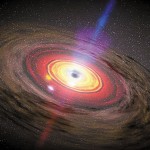In the Dark?
There’s a pretty interesting debate going on between some really bright folks about whether information, or history, can be destroyed. It’s not among real historians, archaeologists, biographers, or anyone else most of us would imagine. It’s among very renowned physicists, luminaries including Stephen Hawking. Dr. Hawking was among the very early to write for the enlightenment of us outside the genius gene pool with “A Brief History of Time.” He is also credited with the conceptualizing and predicting of black holes.
Black holes are entities in the cosmos whose density is so large that they pull in, “suck up” everything around them including light. Nothing gets out, like some in-boxes we all know about. Black holes and their effects on information are what the big debates are about and where reputations are at stake. We know that the regular types of information and histories are destroyed all the time. Information or history is destroyed by cataclysms, wars, book burnings, oral accounts, my faulty memory, and a very long list of other means, including our scary hard disk crashes. It’s sad, but creates lots of opportunities for sleuths of all disciplines.
Here’s the fascinating part. The real physicists out there will rankle at my oversimplification, but I’m just not that smart. A big part of we actually “know” about what’s out there in the cosmos comes from bigger and better telescopes and other measurement technology. The stars, planets, galaxies and other cool stuff are visible because light has travelled big amounts of space-time. For now, let’s just say that it has covered very large distances across space in very long periods of time, light years in fact. We know by now that what we see all happened in the past, including everything near to us since light had to bounce off of or emanate from what we “see.” Light moves very fast, so we believe it’s happening in the “now” and that’s comforting to many.
Here we go. If nothing can escape the black hole’s pull, including light, then the information about a star or galaxy is lost on the way to us if it comes near a black hole. As far as our instruments can tell, the star never happened, the information is lost. This argument has been going for a long while and even Dr. Hawking has moved from his position on the subject. His new position involves perspectives that include more dimensions than we can understand and multiple universes, some without black holes. This stuff is not for everybody.
So it is all about light. We’ve known about it for a long time. We use terms like enlighten, bright, luminary, obscure, in the dark, and other descriptions that have to do with information, knowledge, and other types of history. If we don’t put light on something, or if does not give off light that reaches us, information is lost. It is as if it never happened. Worse, if our management and information systems take data in and it never gets out, information is lost. We have black holes of our own making.
Maybe it’s time to take the debate from the realm of physicists, astronomers, and cosmologists and bring it into the realm of operating an enterprise. Information is being lost, history of what happened no longer exists, and we will make some decisions in the dark. These black holes can be found everywhere. In fact, the post 9-11 investigation revealed that critical information was lost because of interagency black holes and individual biases.
Dr. Hawking has concluded that if we are in one of the parallel universes that does not have black holes, information is not lost. So you can’t have it both ways in any given universe.
But there is hope for our businesses. We can change what and how we execute and create a black-hole-free workplace. It’s good for our health.


